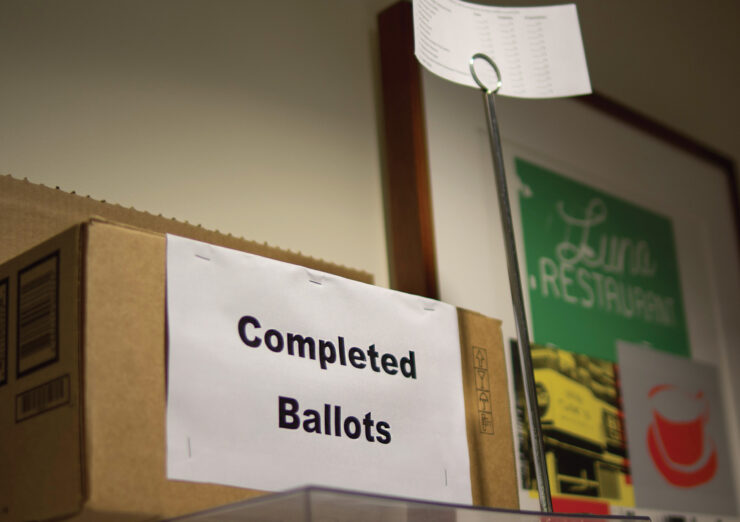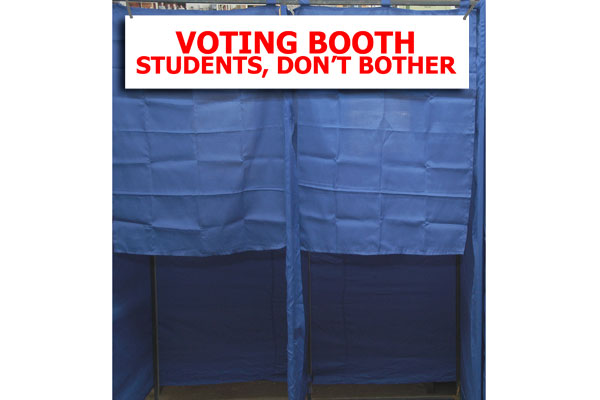If there’s a will, there’s a way. There was no will to adapt the Vote on Campus program for a pandemic election
For many eighteen-year-olds, the 44th Canadian election is the first election in which they are eligible to vote. It’s a big deal — a rite of passage, truly.
Certain birthdays are landmarks. Sweet 16 — if you’re in Ontario, you might get your G1 that day! Perhaps the same year, you might get your G2 and prove it to everyone by jingling your keys or swinging a lanyard on your finger every chance you get. 18 — that’s voting and tattoos! 19 — your very first sip of alcohol ever… right?
This monumental moment, a young person’s first time actively participating in their right to vote, is slightly less picture-perfect this year for many under the pretense of COVID-19.
Unlike the 2015 and 2019 elections, students at the University of Ottawa and universities across the country are not able to vote on campus. Elections Canada has decided not to proceed with their Vote on Campus program for the 2021 election due to inadequate time to prepare in an “unprecedented pandemic environment,”
We can’t help but feel like “unprecedented times” is the new “my dog ate my homework.” Maybe students should start using it themselves. “Dear Professor, during these unprecedented times, I cannot make it to an 8:30 a.m. class on a Monday. Condolences.”
The Vote on Campus initiative served to expand accessible voting for young voters. This was especially beneficial for students voting for their home riding rather than the riding of their university. In the absence of this program, many are confused about how to vote — where does one register, and how does one navigate voting from afar?
As an out-of-town student with an apartment in Ottawa, it was difficult to determine which riding I belonged to, which dates I should remember, and what the registration process was. Deciding who to vote for was the easiest part, while dissecting the Elections Canada website was the hardest. In the end, I wound up voting by mail and was met by more paperwork: a ballot inside an envelope, inside another envelope, and — you guessed it — inside a final envelope. Dropping it off at the Canada Post mailbox down the street was underwhelming. Hooray, I voted.
This feeling of uncertainty is a sentiment shared by many students on campus during this election. It feels akin to how Zoom university feels. With so many online deadlines floating around for school — and now for voting — we as students can’t seem to shake the feeling of: “am I missing something?”
Hayden Kurtossy, a University of Ottawa student and first-time voter, shared a similar sense of confusion in an interview.
“Am I supposed to register to vote online, or am I supposed to go and register when I go to vote, or am I still expecting something in the mail? I kind of know… but at the same time, it’s like, do I have to do something else?,” Kurtossy said.
Though many students new to the polls experienced confusion these past few weeks, it is fair to say out-of-town students had to jump through a few more hurdles.
Myannah Carvery, an out-of-province U of O student, understands that the Elections Canada website has the information needed, but found the process of determining which method best suited her “overwhelming to figure out.” That’s why Carvey, like many other students, prefers the option of voting on campus.
She suggested in an interview that even if voting on campus wasn’t viable this year, it would have been helpful to have information stations on campus for people struggling to navigate the voting process. “Even if I had to mail it in, if I knew that I could come in and have someone be here that could say, ‘Yeah, so you are actually not eligible to vote for the [Ottawa-Vanier riding], you actually have to…’ that would have been really good.”
Moreover, in the case students do eventually figure out whether to mail in their votes or line up at the polls on election day, they then face the problem of what to bring.
“I knew where to go, I was just confused about what I might need to go vote,” expressed Rebecca Karvanis, an out-of-town student who was unsure how to prove her residency in Ottawa.
Even students who belong to Ottawa ridings have had difficulties understanding the voting process. Erin Kohli, an Ottawa resident, experienced similar confusion and would have also benefited from on-campus resources and more streamlined, accessible information.
Kohli suggested it would be ideal to “have a group of councillors, even, that we could talk to and that would have available resources that would tell you more about voting and how to do it.” She continued, “I feel like they could definitely make it a lot easier just by explaining the whole voting process. I know who I’m voting for, but I don’t know what’s really happening. I think that’s the part [on which] I’d like a bit more clarity.”
Outside of accessibility, the opportunity to vote on campus is important because of what it represents. Abeed Zaman, a U of O student, had no problem figuring out the voting process as a first-time voter in this election and Ottawa local. However, Zaman said he valued the importance of having polls on campus, as it represents “that the student voice actually has an impact.”
Ryana Balmir, also an Ottawa resident, favours on-campus voting, for it “would encourage people to vote” and “increase solidarity if there’s action on campus.”
Balmir made an important point about encouraging young people to vote: according to the 2015 National Youth Survey, youth voter turnout is negatively affected by their perception that the voting process is “ too difficult” in terms of getting to the polls and proving their identity. There is already a distinct incongruity between young and older Canadian voter turnout. As such, the loss of Vote on Campus poses a risk in reduced voting accessibility and youth turnout.
Elections Canada has one responsibility: be ready for an election. Their role is to make the voting process simple and accessible. Sure, we are in unprecedented times — but we’re 19 months deep into it. Every aspect of society has had to make modifications accordingly. Adapt, overcome, achieve. I was a camp counselor for two COVID-19 summers! I made kids play tag with pool noodles, not share supplies, and stay six feet apart. Have you met a five-year-old? I made them wear masks and not hug one another. That’s a near-impossible feat. But, rather than eliminate a program, we adapted.
What we’re getting at is: if there’s a will, there’s a way. Students’ voices should have been prioritized. Modifications could have been made as needed, but that should have been regulations about distancing, masks, designated times. It should not have been the elimination of a program that would have benefited out-of-town students and Ottawa locals alike. If students’ voices are a priority, prove it. Actions speak louder than words.
Editorials are usually written by the Fulcrum’s 16-person editorial board and express the shared views and opinions of the Fulcrum’s editorial staff. This editorial was originally written as an op-ed by the Fuclrum’s opinions editor Sanjida Rashid. Due to the quality of its content, it was edited into an editorial. To share your own views, email editor@thefulcrum.ca.





